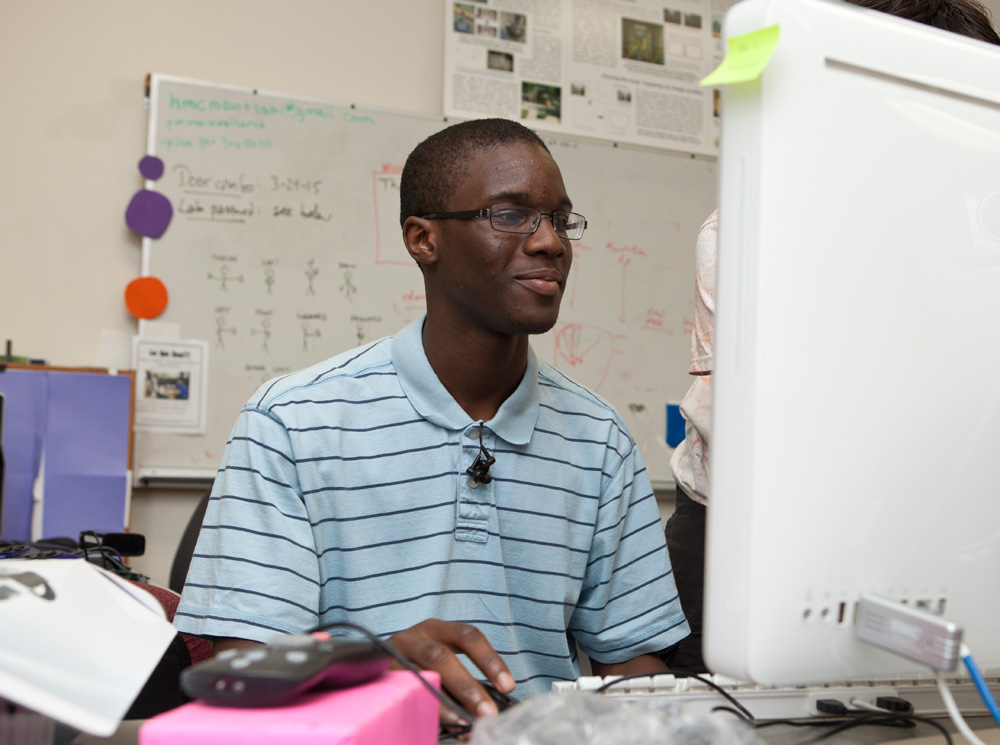Harvey Mudd Launches BRAID Initiative to Increase Diversity in Computer Science
September 24, 2014
Harvey Mudd College and the Anita Borg Institute, a nonprofit organization focused on advancing women in computing, have launched an initiative to work with computer science departments at 15 universities across the U.S. to increase the percentage of their undergraduate majors that are female and students of color.
The Building Recruiting And Inclusion for Diversity (BRAID) initiative was announced on Sept. 24, 2014, by former Secretary of State Hillary Clinton during her address at the 2014 Clinton Global Initiative (CGI) Annual Meeting, as part of the Girl’s CHARGE, a CGI Commitment to Action comprised of 30 companies, civil society organizations, multilaterals and governments to improve learning and leadership opportunities for young women and girls. This collective effort, CHARGE—Collaborative for Harnessing Ambition and Resources for Girls’ Education—has raised over $600 million to reach 14 million girls over five years.
BRAID is supported by three-year funding commitments from Facebook, Google, Intel and Microsoft. Maria Klawe, president of Harvey Mudd, and Telle Whitney, president and CEO of ABI, will lead the BRAID initiative.
“Undergraduate computer science departments across the country are interested in attracting women and underrepresented minorities to their programs,” said Whitney. “Leveraging the experiences of successful programs like those at Harvey Mudd College provides an attractive path to redesigning their programs. BRAID is designed to jump start their efforts and document the results to identify best practices that consistently yield results.”
Under BRAID, the 15 academic institutions’ computer science departments have committed to implementing a number of approaches that have demonstrated success at Harvey Mudd and other institutions. These approaches include expanding outreach to high school teachers and students, modifying introductory CS courses to make them more appealing and less intimidating to students from underrepresented groups, building community among underrepresented students, and developing joint majors in areas like CS and biology to encourage interdisciplinary approaches. Participating universities will provide data for a research study documenting the progress made across departments. Professor Linda Sax, GSEIS, UCLA, will lead the research study on the program’s implementation. In addition, each of the departments will receive $30,000 per year for three years to help support their efforts.
The participating undergraduate computer science programs are:
- Arizona State University
- Missouri University of Science and Technology
- New Jersey Institute of Technology
- University of California – Irvine
- University of Illinois – Chicago
- University of Maryland – Baltimore County
- University of Maryland – College Park
- University of Nebraska – Lincoln
- University of North Texas
- University of Rochester
- University of South Carolina
- University of Texas – El Paso
- University of Vermont
- University of Wisconsin – Milwaukee
- Villanova University
Over the past eight years, Harvey Mudd College’s computer science department worked diligently to increase enrollment of female and minority students in undergraduate courses. Today, Harvey Mudd’s computer science undergraduate majors are roughly 40 percent women. Computer science faculty from Harvey Mudd will visit participating departments to give advice and feedback.
“The BRAID initiative is the most exciting project I’ve been involved with to expand diversity in computer science,” said Maria Klawe, president of Harvey Mudd College. “I’m thrilled by how enthusiastic department chairs have been about taking on this initiative to change their culture in a way that will make it more inclusive to underrepresented groups, including women and minorities. It’s also inspirational to see how quickly the four companies stepped up to fund the initiative and the research study on effective educational practices.”
Each participating university will be encouraged to send underrepresented students and computer science faculty to the annual Grace Hopper Celebration of Women in Computing and to the biannual Tapia Conference.
BRAID is a joint initiative led by the Anita Borg Institute and Harvey Mudd College launched with the hope of extending it for a further three years if sufficient progress is made. Departments not already doing so will be encouraged to use the extension services offered by NCWIT, which will receive funding from the project.
To facilitate and expand the work of CHARGE, No Ceilings: The Full Participation Project—a Clinton Foundation initiative led by Secretary Clinton and Chelsea Clinton—will commit to convene the collaborative, track progress and enable outreach to future partners. Last year at CGI, Secretary Clinton announced the launch of No Ceilings with a call to fulfill the unfinished business of the 21st century and make an evidence-based case for the full participation of women and girls around the globe. As No Ceilings evaluates data on the status of women and girls over the last 20 years, it is evident that ensuring equal and adequate education for girls, through secondary school and beyond, is essential for improving the health, stability and prosperity of communities and countries around the world.
